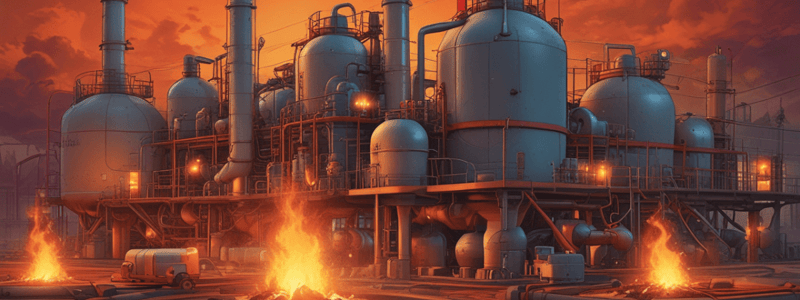Podcast
Questions and Answers
What is the primary concern when extinguishing a natural gas fire?
What is the primary concern when extinguishing a natural gas fire?
- Putting out the fire as quickly as possible
- Preventing the spread of natural gas to other areas (correct)
- Stopping the natural gas flow to the entire building
- Checking for natural gas accumulations in nearby buildings
Who may attempt to stop the natural gas flow to an entire building?
Who may attempt to stop the natural gas flow to an entire building?
- Anyone who has access to the building
- TFS personnel only
- Enbridge Gas Distribution representatives only
- TFS personnel by closing the natural gas meter supply valve (correct)
When should TFS personnel shut off the natural gas flow at a single appliance?
When should TFS personnel shut off the natural gas flow at a single appliance?
- When the fire is isolated to a single appliance (correct)
- When the fire is spreading rapidly
- When the fire is small and easily extinguished
- When the natural gas supply valve is readily accessible
Why should consideration be taken when turning off the natural gas flow to commercial or industrial buildings?
Why should consideration be taken when turning off the natural gas flow to commercial or industrial buildings?
Who has access to underground natural gas supply valves to buildings?
Who has access to underground natural gas supply valves to buildings?
What should personnel do before shutting off the natural gas flow to a single appliance?
What should personnel do before shutting off the natural gas flow to a single appliance?
What should be checked for after extinguishing a natural gas fire?
What should be checked for after extinguishing a natural gas fire?
When should the natural gas supply be shut off in a building that is not on fire?
When should the natural gas supply be shut off in a building that is not on fire?
What should TFS personnel do if they suspect natural gas/methane is present in a confined space?
What should TFS personnel do if they suspect natural gas/methane is present in a confined space?
Why should water not be used in an excavation hole?
Why should water not be used in an excavation hole?
Who should stop the flow of a broken natural gas pipe?
Who should stop the flow of a broken natural gas pipe?
What is the limit of TFS personnel's control of escaping natural gas from damaged pipes?
What is the limit of TFS personnel's control of escaping natural gas from damaged pipes?
Who should operate natural gas valves installed on system mains, stations and commercial/industrial service lines?
Who should operate natural gas valves installed on system mains, stations and commercial/industrial service lines?
Where are natural gas system main, station and commercial/industrial valves installed?
Where are natural gas system main, station and commercial/industrial valves installed?
Who may close residential service line shut-off valves?
Who may close residential service line shut-off valves?
What should be done if a valve is closed?
What should be done if a valve is closed?
Flashcards are hidden until you start studying
Study Notes
Control of Natural Gas Fires
- TFS personnel should not extinguish a natural gas fire unless the natural gas flow or leak can be stopped by closing natural gas supply valves before or immediately after extinguishment of the fire to prevent the spread of natural gas to other areas, which can lead to explosion or rapid fire.
Stopping Natural Gas Flow
- The natural gas flow to an entire building can be stopped by closing the natural gas meter supply valve.
- Readily accessible natural gas supply valves can be closed by TFS personnel to stop the flow of natural gas when safe to do so.
- Consideration should be taken when turning off the natural gas flow to commercial or industrial buildings, as it may interrupt important production processes and create further hazards.
- Underground natural gas supply valves to buildings may only be accessible to Enbridge Gas Distribution representatives.
Isolated Fires and Precautions
- If the fire is isolated to a single appliance, personnel should shut off the natural gas flow at the appliance supply valve.
- Personnel should spray water fog on any surrounding combustibles and/or exposures if in danger of igniting before natural gas flow can be stopped.
- It is essential to check for natural gas accumulations in nearby buildings, sewers, etc., using natural gas monitoring instruments.
Natural Gas/Methane in Confined Spaces
- TFS personnel should not enter a confined space, maintenance hole, sewer, vault, or excavation if natural gas/methane is suspected to be present.
- The Incident Commander shall ensure personnel do not use water in an excavation hole, as it can fill the hole and weaken the site's integrity, making entry for repair more hazardous for utility personnel.
Damaged Natural Gas Pipelines, Meters, and Pressure Regulators
- TFS personnel should not attempt to stop the flow of broken natural gas pipes, meters, or pressure regulators; instead, they may assist trained and equipped Enbridge Gas Distribution personnel.
- The hazards associated with plugging/capping metal pipe and crimping/clamping of plastic pipe can only be eliminated by trained and equipped Enbridge Gas Distribution personnel.
- TFS personnel should only turn off the natural gas at supply valves and not operate any underground or aboveground regulator stations or commercial/industrial service line valves.
Studying That Suits You
Use AI to generate personalized quizzes and flashcards to suit your learning preferences.



